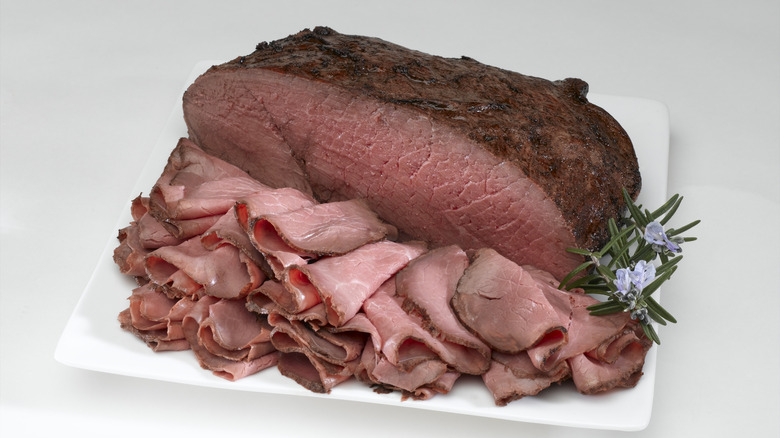The Science Behind Why Some Deli Meats Last Longer Than Others
Deli meat is one of those modern convenience products we probably don't marvel at as often as we should. For most of human history, you couldn't simply go buy a half pound of roast beef or Black Forest ham down the street whenever you felt like it, but now, sandwiches are only a few bucks and a tiny amount of assembly time away at any given time. We say "the best thing since sliced bread" a lot, but deli meat is right there with it.
But while deli meat is a great example of human ingenuity, you've probably noticed that some of your sliced meat lasts a lot longer than others. A week after you open it, turkey might be green and slimy, but that pepperoni has been in there for literally months with no issues. What gives? Why do some deli meats last longer than others? It turns out, the answer has to do with the level of acidity and moisture contents of specific meats, and how fermentation and drying affect their processing.
Fermenting and drying keeps meat fresh
You might be wondering, "Wait, fermentation, like alcohol?" Correct. Fermentation may be most closely associated with alcohol, but it has a lot more applications in food production than just beer and wine. In the simplest possible terms as it's applied to how food is made, fermentation is the process by which microorganisms change a food or beverage — as with yeast in beer. But there's nothing definitionally alcoholic about it, and some deli meats are produced using fermentation. Certain deli meats, like pepperoni and salami, are naturally fermented as part of the process of preparation, which ultimately lowers their pH level, increasing their natural acidity. Bacteria really, really hates acid, which is why unopened fermented meats will literally last indefinitely in the fridge.
Dried cured meats, meanwhile, take a different route to arrive at a similar endpoint. This process is much simpler to explain: instead of raising the acid content of the meat, the curing process of something like prosciutto removes a lot of its moisture, and just like it hates acidity, bacteria really hates dryness. Drying and fermentation are also why capicola, pepperoni, and other deli meats will take to the freezer much better than sliced deli chicken. This is because foods with higher moisture content suffer more textural issues during the freezing process.
Other deli meats are more bacteria prone
Compare this with something like turkey, ham, or roast beef, which is simply cut and served slightly wet. That moisture is great for the texture of a sandwich, but it isn't ideal for keeping the meat in question fresh for particularly long. Moisture is the enemy of freshness; that's why putting a couple of paper towels in a plastic bag of salad keeps it fresh for longer. Combine this wetness with a lack of fermentation and it's easy to understand how the meat goes bad quicker.
Funny enough, though, people often get it wrong with whether or not deli meats have gone bad. To be sure, if it's green and moldy, throw it out; But if you see iridescent rainbow colors on your meat, it's just light reflecting off the protein's cut muscle fibers and it's probably still perfectly safe to eat. So while you should be cautious with wetter meats like oven-roasted turkey or honey-baked ham as compared to prosciutto or salami, you should still use the smell and texture tests to determine whether eating them is a good idea.


